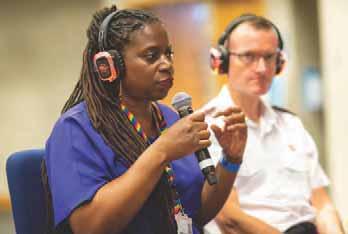
3 minute read
Feature
IN the UK, 1 in 4 women and 1 in 6 men will be a victim or survivor of domestic violence and abuse (DVA). Two women in the UK are killed every week by a current or former male partner (Office for National Statistics, 2019) and, on average, the police in England and Wales receive more than 100 calls relating to DVA every hour (HM Inspectorate of Constabulary, 2015). DVA, whether physical, psychological, sexual, spiritual or financial, is happening all around us. That includes within our churches, where domestic violence and abuse happens at the same rate. DVA is not a private matter, and we have a responsibility to end it.
This is why the Family Ministries Unit recently partnered the University of Leeds and I was recruited to undertake a PhD developing The Salvation Army’s response to DVA. I aim to be led by victims, survivors and Army frontline leaders. This is part of the Mission Service’s commitment to support and promote mission underpinned by research.
Research tells us that DVA is gendered. Women are more likely than men to be victims or survivors because DVA takes place within a larger context of male violence against women and girls, rooted in structural inequalities that uphold women’s unequal status and promote masculinities that maintain power over others, particularly women. This violence is also used against men and boys who don’t conform to these gendered norms and expectations.
The Bible is full of accounts of this misuse of power – not because God supports it, but because God wants us to take notice. Genesis 16 gives us the story of Hagar, a foreign slave girl who is forced to give Abram a child before being cast out, yet God sees her and validates her trauma. In 2 Samuel and 1 Kings, we are told of Bathsheba, whom King David commands to be brought to him for his sexual gratification, leading to her losing her husband and later her child, yet God is with Bathsheba as she advocates for her son to take his rightful place as king. Women, such as the concubine in Judges 19, are discarded and violated by those closest to them without even the dignity of a name. Yet God is always on the side of those marginalised and abused. He is there to see, validate, strengthen and heal them.
The 2018 research paper In Churches Too found that more churchgoers sought help for DVA from outside the church than inside, as most churches did very little to respond to DVA. The UN’s 16 Days of Activism against Gender-Based Violence runs from 25 November to 10 December. The campaign gives us an opportunity to engage with the issue of violence and abuse more intentionally, challenging attitudes, beliefs and behaviours that condone and contribute to DVA.
God sees – so should we
Amy Quinn-Graham calls Salvationists to stand up against domestic violence and abuse
THINK AND RESPOND
Here are some ideas to help you think more deeply about DVA and equip you to speak out and respond: Commit to exploring one of the
Bible accounts of gender-based violence mentioned below. Who has the power in the situation?
What does God’s response tell us about how he views those violated and abused? Read the Rev Dr Helen Paynter’s book The Bible Doesn’t Tell Me So, which challenges the passages of
Scripture commonly used to uphold harmful attitudes around DVA. Get involved in the Red Chair
Project: reserve an empty chair in your setting, workplace or another public space for one of the many women who have been killed by gender-based violence. Visit restored-uk.org for more.
SUPPORT AND ADVICE
If you or someone you know has experienced or is experiencing domestic violence and abuse, you can use the following details to access support and advice: For Refuge, call the free 24-hour
National Domestic Abuse Helpline on 0808 2000 247 For DVA support, visit
womensaid.org.uk
For DVA support from a
Christian perspective, visit
restored-uk.org/i-need-help
If you are facing an emergency, call 999
To hear more about the PhD research or share what your setting is doing to respond to those experiencing DVA, email amy.quinn-graham@ salvationarmy.org.uk or familyministries@salvationarmy.org.uk
AMY QUINN-GRAHAM
Action Researcher Family Ministries Unit










